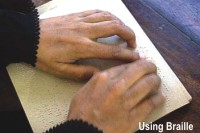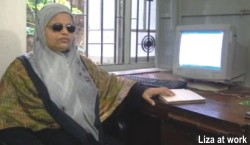|
Perspective
Out of Sight
Out of Mind?
Andrew Morris
 Farzana Taleb turns from her computer to greet me. On the screen I read the title of a document which she has just been typing, entitled “Women with Disability”. Exactly what you'd expect from a Program Manager at a small Lalmatia-based NGO like Social Assistance and Rehabilitation for the Physically Vulnerable (SARPV). Farzana, who is also known as Liza, has responsibility for a wide range of women's rights issues, and leads a busy life, shuttling between home and office. Incidentally, Liza is totally blind. Farzana Taleb turns from her computer to greet me. On the screen I read the title of a document which she has just been typing, entitled “Women with Disability”. Exactly what you'd expect from a Program Manager at a small Lalmatia-based NGO like Social Assistance and Rehabilitation for the Physically Vulnerable (SARPV). Farzana, who is also known as Liza, has responsibility for a wide range of women's rights issues, and leads a busy life, shuttling between home and office. Incidentally, Liza is totally blind.
Be honest. Are you surprised? There are clues for you in the photographs of course. I was initially a little taken aback by Liza's ease at the PC, then rather ashamed at being taken aback. In the UK we have had in recent years a Home Secretary (Interior Minister) who was blind, occupying one of the seniormost political positions in the country, so I should have known better, but then I'm partially let off the hook by the fact that like most of my fellow sighted people, I have had limited contact with visual impairment all my life. And people who are without sight, it seems, really are outside our minds most of the time, so my surprise at what I learn is not so much the result of prejudice, but of ignorance, both of the issues and of the facts.
Here are a few. According to the World Health Organisation's last census there are 37 million blind people in the world, and a further 124 million with low vision. Over 80% of blind people worldwide are aged over 50, with females at a higher risk than males at all ages. Cataracts, as highlighted recently in this magazine, are by far the leading causes of blindness. Only about 4% of worldwide sufferers contract blindness in their childhood, and it's estimated that globally, about 75% of all blindness is avoidable.
As to the issues, certainly with me, and I suspect among the population at large, there is very little awareness of what it is to live as a blind person, what challenges are faced and what means, both practical and technological, people use to overcome them. Fortunately, Liza, who contracted smallpox (as did her sister, who remained sighted) and lost her sight at the age of two and a half, is a patient and informative teacher, who also speaks excellent English.
 It's immediately clear that blind people have a whole host of compensatory strategies to make up for their disability. She has no memories of seeing in her early years, and so has depended almost all her life on her other senses. Sitting, talking to me, she says that she judges a great deal about people by their voice, and only tries to imagine the physical features of those to whom she is close, and whose faces she can touch with her hands. Asked to guess my age, without hesitation she says 40-45. How on earth did she manage that? It's immediately clear that blind people have a whole host of compensatory strategies to make up for their disability. She has no memories of seeing in her early years, and so has depended almost all her life on her other senses. Sitting, talking to me, she says that she judges a great deal about people by their voice, and only tries to imagine the physical features of those to whom she is close, and whose faces she can touch with her hands. Asked to guess my age, without hesitation she says 40-45. How on earth did she manage that?
Liza travels around by rickshaw and knows intimately the way home, depending on sounds, the direction of the wind, the sudden turns in the road to locate herself exactly in the small winding streets of Lalmatia. At a later point in our conversation, the diminutive maid enters the room. Without missing a beat Liza asks her to serve me biscuits and a soft drink. “How did you know who it was?” I ask, but at this Liza can only smile. “I know everyone in this office by their footsteps” a she leads me out through the narrow corridors, she walks as assuredly through this familiar space as any sighted person would.
Blind people lead independent lives in many ways. Liza herself lived alone for several years, but now stays with her family. As it happens, she doesn't cook these days, but knows plenty of blind people who do. When asked what the challenges were of living alone, she has to think hard before coming up with a couple of practical examples: not having anyone to read her sms off the phone, for instance, or not knowing how to find the stain on a shalwar kameez which had to be washed.
But her need for independence is not always understood by everyone. Liza laughs as she recounts how well-meaning relatives instruct her to sit when she'd rather stand, try to feed her at the table and pop chanachur into her mouth. She talks of how she gets pushed and pulled at social gatherings, reminding me of the presenter back home of a radio programme for the blind who complained of being generously helped while at railway stations on to trains he never wanted to board in the first place. Even if he had, finding an empty seat would be a more thoughtful way to help him than locating the train door, which is fairly obvious after all.
On the whole, however, Liza says that people are mostly kind and helpful to her, and can only recall one incident of malice from many years ago when a rickshaw driver convinced her that the 100 taka note she was handing over was actually only a 10 taka note.
Life is made easier by technology of course, of which the most obvious example is Braille. Devised way back in 1821 by the Frenchman Louis Braille, this system which most blind people use to read and write is based on rectangular boxes or cells, each comprising six dots, which are raised in any one of sixty-four different permutations. Each cell forms a letter of the alphabet. Liza uses a complex machine to write Braille, by punching the right combinations onto a card held in a metal frame, and then is able to read swiftly by trailing her fingers across the page. The speed and sensitivity are impressive: my own fingers, when they touch the script, feel hardly a thing.
Then there's the computer software, with its voice-activated instructions and ability to describe its own operations through a mechanical voice of its own. Her mobile is of course a godsend, although the handsets which can read sms out loud are prohibitively expensive. Late in the afternoon, I am suddenly surprised by a disembodied voice saying “It's now five o'clock”. This of course is Liza's speaking watch.
But despite access to such technology, some of the mainstays of unsighted life in the west are unavailable. Above all there are no guide dogs, which Liza maintains would be confused by the mud and the unevenness of the streets. And it is here on the streets that she faces her biggest obstacle the crowds, the wayward traffic, and the fact that the buses hardly stop at all en route, let alone at designated locations.
There are wider social challenges of course. Despite the fact that Liza went to a special school where they followed the national curriculum with the aid of Braille books, there are very few specially equipped schools in the country for people with low vision or visual impairment: only one per district. Meanwhile, teachers in mainstream schools are generally unaware of how to accommodate such pupils, although inclusive education programs are currently being planned nationwide to raise awareness of this and other disabilities. Liza adds that later in life, jobs are hard to come by: most blind people end up as teachers or trainers. There are anti-discrimination policies at national level, she maintains, which are designed to offset the disadvantages of visual impairment, but in a familiar refrain, she observes that these are never fully implemented.
If Liza has a message for the general public it's simply that she wants blind people to be treated as normal. And as I prepare to leave the office, SARPV's Chief Executive Shahidul Haque, echoes her words. “Just remember that” he says, “everyone is a potential candidate for disability. It could happen to you quite easily. So when you make allowances, when you try to understand, don't do it for us, do it for yourselves.” Copyright
(R) thedailystar.net 2007 |
|
